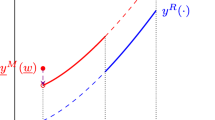Abstract
In The Community of Advantage, Robert Sugden advocates a system of universal social insurance to ensure that all citizens enjoy the benefits of market institutions. The Community of Advantage however does not shed light on the extent of redistribution that social insurance should provide. While the criterion of mutual advantage seems to licence only a minimal level of insurance, people’s expectations and collective bargaining power are likely to lead to a much more extensive redistribution. This is not necessarily a bad thing, since a well-functioning society is more than a well-functioning market economy. An extensive social insurance protects the rich, the poor, and, above all, the cooperative attitudes without which a democratic society cannot function well.
Similar content being viewed by others
Notes
A notable exception is David Miller’s Principles of Social Justice (1999).
See, e.g. Leiser & Shemesh (2018), chapter 8.
In developing countries, the inequality in fiscal contribution is even more extreme due to poverty and to the practical difficulty of collecting taxes.
This is a familiar argument that has been used to question utilitarianism and preference-satisfaction theories of welfare: the fact that Jack’s utility from eating caviar is greater than Jill’s utility from reading a book, does not seem to justify the choice of giving caviar to Jack instead of giving a book to Jill. Amartya Sen’s well-known “battered housewife” argument has the same structure.
“To say this is not to treat rich individuals’ contributions to social insurance merely as a kind of protection money” (TCOA, p. 204).
This may be one of homo sapiens’ oldest tricks: according to some anthropologists (e.g. Boehm 1999) the egalitarian ethos of hunter-gatherers’ societies is primarily aimed at curbing the rise of would-be tyrants and bullies.
References
Anderson ES (1999) What is the point of equality? Ethics 109:287–337
Anderson E (2008) How should egalitarians cope with market risks? Theor Inq Law 9:239–270
Arrow KJ (1984) Collected papers of Kenneth J. Arrow, volume 1: social choice and justice. Blackwell, Hoboken
Boehm C (1999) Hierarchy in the forest: the evolution of egalitarian behavior. Harvard University Press, Cambridge
Brennan J, Buchanan J (1985) The reason of rules. Cambridge University Press, Cambridge
Gauthier D (1985) Morals by agreement. Oxford University Press, Oxford
Güth W, Kocher MG (2014) More than thirty years of ultimatum bargaining experiments: motives, variations, and a survey of the recent literature. J Econ Behav Org 108:396–409
Hayek F (1976) Law, legislation, and liberty. Routledge, Abingdon
Hume D (1777) Political essays. Cambridge University Press, Cambridge
Leiser D, Shemesh Y (2018) How we misunderstand economics and why it matters. Routledge, Abingdon
Miller D (1997) Equality and justice. Ratio 10:222–237
Miller D (1999) Principles of social justice. Harvard University Press, Cambridge
Rawls J (1971) A theory of justice. Oxford University Press, Oxford
Roth AE (1995) Bargaining experiments. In: Kagel JH, Roth AE (eds) The handbook of experimental economics. Princeton University Press, Princeton
Sugden R (1986) The economics of rights. Cooperation and welfare. Palgrave-MacMillan, London
Sugden R (1990) Contractarianism and norms. Ethics 100:768–786
Sugden R (2018) The community of advantage. Oxford University Press, Oxford
Acknowledgements
I must thank the organizers and participants to the workshop on The Community of Advantage that took place in Rome in November 2019, where the ideas of this paper were originally presented. I would also like to take this opportunity to acknowledge my intellectual debt to Bob Sugden: when I first met him in the late 1990s, I knew him primarily as a prominent experimental economist who was interested in the methodological foundations of his discipline. At the time, I didn’t know that he was also a wonderful philosopher in the tradition of Hume. But above all, I didn’t know that I was a Human myself: Bob played a major role in this discovery, for which I will be forever grateful.
Author information
Authors and Affiliations
Corresponding author
Ethics declarations
Conflict of interest
The author declares that he has no conflict of interest, and did not receive any funding for this study.
Human and animal rights
This study did not involve research with animals or human participants.
Additional information
Publisher's Note
Springer Nature remains neutral with regard to jurisdictional claims in published maps and institutional affiliations.
Rights and permissions
About this article
Cite this article
Guala, F. Behavioural politics: social insurance and mutual benefit in Robert Sugden’s The Community of Advantage. Int Rev Econ 68, 89–100 (2021). https://doi.org/10.1007/s12232-020-00353-x
Received:
Accepted:
Published:
Issue Date:
DOI: https://doi.org/10.1007/s12232-020-00353-x



